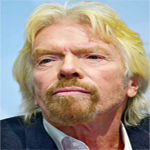I’m passionate about becoming a successful businessman and believe I would enjoy the benefits of being wealthy. But at the age of 52, I’m wondering if I’m too told to become an entrepreneur. What do you think? — Stephen Samuel, India

Column
I’m passionate about becoming a successful businessman and believe I would enjoy the benefits of being wealthy. But at the age of 52, I’m wondering if I’m too told to become an entrepreneur. What do you think?
— Stephen Samuel, India
A: That’s a very interesting question, Stephen. I’m sure you’ve already asked other people and that many of them have told you not to bother. Once you get over the age of 50 everyone expects you to start thinking about retirement. The last thing you should do is launch a whole new venture.
Well, I disagree entirely. On my 65th birthday I was asked, yet again, if I had plans to retire and, yet again, I said no. I still love leading the Virgin Group and I have no desire to stop any time soon.
You’re never too old to start a business and run it well (health permitting, of course) — and the statistics agree with me. Data from the U.K. Office for National Statistics shows that nearly 1.8 million people over the age of 50 were self-employed in 2015. And according to a survey by Age UK, 70% of businesses started by people over 50 last for at least five years, compared to just 28% of businesses started by those under 50. Additionally, according to a report from the Kauffman Foundation in the U.S., those aged 55 to 64 now represent more than 25% of new entrepreneurs — an astonishing rise from 1996, when they represented just 15%. So Stephen, you’re certainly not alone in thinking about launching a business later in life.
In fact, some of the world’s most successful enterprises were started by people who were older than you might expect. Henry Ford was almost 40 when he founded his car business; Charles Ranlett Flint started the computing business that later became IBM at the age of 61; and Col. Harland David Sanders was 62 when he launched Kentucky Fried Chicken. You’re not past your prime, Stephen. On the contrary, you could be just coming into your own.
There are real advantages to starting a business as an older person, not least of which is the wealth of experience you’re likely to have. You’ve already worked for many years, and possibly for many different employers. So take all the knowledge you’ve gained and use it to build the best business you can.
Think about what you disliked about the organizations you worked for in the past, and how you would change them. Consider the owners of these businesses and whether they tried to boost their staff’s well-being. What was it that made you want to work for these companies? Did they create fun working environments or offer generous annual leave policies? What about flexible work arrangements for new parents? The beauty about starting a business, regardless of your age, is that you get to decide where your organization stands on these kinds of issues.
One of your top priorities when launching a business should be choosing the right people. You need a team you can trust, a team that can turn your idea into reality. I often say that you should always hire to account for your weaknesses. I learned very early on that I needed to delegate certain tasks to other people. At school, there were some things that I really struggled with, such as math, because I was dyslexic. Later on as a businessman, one of the first hires I made was an accountant.
But before you worry about hiring or any other major decisions, take some time to consider why you want to launch a business in the first place. You say that you want to become a successful businessman in order to enjoy the rewards that come with that. But I believe that you should never start a business just to make money. Above all, you must be passionate about your work.
Launching a company involves a lot of long hours, hard work and, at least in the beginning, probably not much money. If financial rewards are your only or primary motive for starting a business, don’t waste your time.
Instead, figure out what you’re passionate about and the problems you want to solve; then build a business that surprises and delights your customers. Do all that and you’ll benefit in more ways than just financially. If you have a great idea — and the passion to pursue it — nothing can hold you back.
(Questions from readers will be answered in future columns. Please send them to Richard.Branson@nytimes.com. Please include your name, country, email address and the name of the website or publication where you read the column.)
© 2017 Richard Branson (Distributed by The New York Times Syndicate)